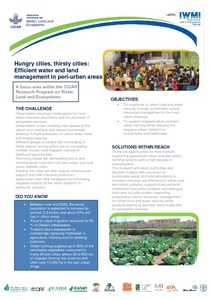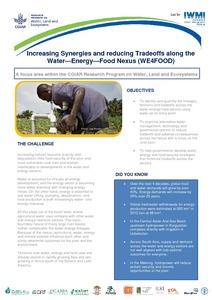Location
The International Water Management Institute (IWMI) is a non-profit, scientific research organization focusing on the sustainable use of water and land resources in developing countries. It is headquartered in Colombo, Sri Lanka, with regional offices across Asia and Africa. IWMI works in partnership with governments, civil society and the private sector to develop scalable agricultural water management solutions that have a real impact on poverty reduction, food security and ecosystem health. IWMI is a member of CGIAR, a global research partnership for a food-secure future.
IWMI’s Mission is to provide evidence-based solutions to sustainably manage water and land resources for food security, people’s livelihoods and the environment.
IWMI’s Vision, as reflected in the Strategy 2014-2018, is ‘a water-secure world’. IWMI targets water and land management challenges faced by poor communities in the developing countries, and through this contributes towards the achievement of the United Nations Millennium Development Goals (MDGs) of reducing poverty and hunger, and maintaining a sustainable environment. These are also the goals of CGIAR.
IWMI works through collaborative research with many partners in the North and South, and targets policymakers, development agencies, individual farmers and private sector organizations.
Resources
Displaying 271 - 275 of 959Hydrogeology of the eastern Ganges Basin: an overview
The Ganges Basin is a part of the Ganges-Brahmaputra-Meghna (GBM) River Basin and is one of the most populated (600 million) river basins in the world. This study focuses on the Eastern Ganges Basin (EGB) and covers India (Bihar, Jharkhand and West Bengal), Bangladesh and the Nepal Terai. Poverty is acute in the EGB, where household incomes are low, food security is not assured and devastating floods (and also water shortages) occur too often. The EGB is underlain by one of the most prolific aquifers in the world.







